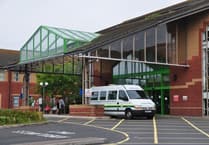‘WE are still in the depths of crisis’ warns the Royal College of Emergency Medicine, which calls on the South West MPs for support.
Responding to the latest Emergency Department performance figures for January 2023 for the South West Region Dr James Gagg, South West Regional Chair of The Royal College of Emergency Medicine, said: ‘January continued to be extremely challenging for the NHS in the South West. Emergency Medicine staff as well as our ambulance service colleagues have continued to face severe pressures.
In Devon the Integrated Care Board reports there were a total of 34,846 attendances to A&E in January.
Of these 15,334 were waiting for less than four hours from arrival to admission, transfer or discharge. This equates to 65 per cent of patients. But 8,249 waited more than four hours.
The number of patients who spent more than four hours from decision to admission was 3,127 and those waiting more than 12 hours were 1,445.
‘The data once again show large numbers of patients facing extremely long waits for emergency care,' said Dr Gagg.
‘This is distressing for our patients and their families, distressing for ambulance crews who aren’t able to attend calls as quickly as they would like, and distressing for Emergency Department staff who aren’t able to deliver the optimal care they are trained to provide.
‘Current conditions are tough.
‘Crowding remains extreme, patients are being cared for in corridors and inadequate areas where there is little to no dignity or privacy.
‘We are still in the depths of crisis.’
‘The main driver of the delays in Emergency Care is exit block – this is where patients cannot be admitted to a bed on wards from the Emergency Department because there are no beds available for them, and patients on wards are unable to be discharged because there is a significant lack of social care to support the timely discharge of patients.
‘The system throughout the hospital becomes gridlocked, like a traffic jam, everything and everyone is stuck.
‘Patients who should be discharged spend longer than they should in hospital, and patients who should be admitted from the Emergency Department to a bed spend longer than they should in the Emergency Department. Emergency Departments become full and crowded and patients face longer and longer waits - that we know are associated with patient harm and even deaths.
‘It is an uncomfortable and dire situation that must be addressed.
‘We welcome NHS England’s urgent and emergency care delivery plan while it contains many of the right initiatives, in the South West we do not have the staff to implement them.
‘Moreover, existing staff are stretched to their limit and we are worried that EM doctors and nurses will leave if they are pushed to do more with less. It is vital that there is a drive to retain existing staff alongside a drive to recruit new staff in the South West.
‘It is also critical that we see an expansion of capacity across Trusts in the South West, where safely possible.
‘This would help improve flow throughout our hospitals and reduce crowding in our Emergency Departments. In tandem with this, we must see investment and resourcing of social care, so that patients can be discharged and supported on their return home or to the community.
‘We need our local Members of Parliament and councils to recognise the pressure on emergency care services in the South West and we urge for their advocacy to retain and recruit staff, to expand capacity, and to resource social care.
‘Our campaign Five priorities for UK Governments to #ResuscitateEmergency Care is our action plan to tackle this crisis, improve patient care and retain staff.’
The latest regional monthly performance figures published by NHS England for January 2023 for the South West show:
• In January, there were 100,808 attendances at Type 1 Emergency Departments, this is comparable to attendance figures in January 2022 (102,084 attendances).
• This accounted for 8.1% of all attendances in England.
• Four-hour performance at Type 1 Emergency Departments stood at 56.5%.
• Despite attendances and demand being comparable to January 2022, four-hour performance was 10% worse.
• 43,851 patients spent four-hours or more in an Emergency Department
This is equal to just over one in two attendances.
• 32.1% of Type 1 attendances (31,939 patients) were admitted.
• This is 12.3% higher than the month before (28.7%) but 0.9% lower than in January 2022 (32.6%).
• 4,799 patients spent 12-hours or more in an Emergency Department from when the decision to admit was made.
• This figure is 88.4% higher than January 2022 which saw 2,547 patients wait 12 hours from when the decision to admit them was made.
• One in six patients who were admitted to hospital waited 12-hours or more in an Emergency Department after the decision to admit them was made.
• This means that the sickest/most vulnerable patients disproportionately experienced delays to receive the care they needed.
You can access the figures at




Comments
This article has no comments yet. Be the first to leave a comment.